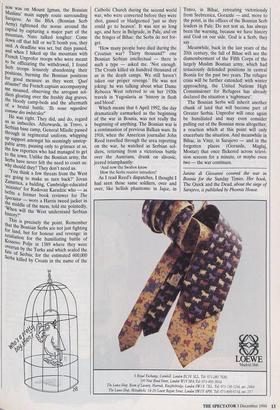1389 AND ALL THAT
Janine di Giovanni argues that the Serbs'
strength lies in the fact that they have six centuries of fighting experience
Belgrade WILLIAM PERRY was right when, grim. faced, he told NBC news over the weekend that even Nato planes could not stop the Serbs, should they decide to make the final push for Bihac. Edward Joseph, a UN spokesman in Zagreb, echoed the US defence secretary when he concluded that 'the Serbs can just sit there and shell away'.
General Sir Michael Rose, the British UN Commander in Bosnia — looking even more piqued than he did last week — told reporters in Sarajevo that the fall of Bihac could mean a possible withdrawal of UN troops, then backtracked the next day when he realised the weight of his state- ment. This is a typical week in Bosnia: the end result being that the Serbs, once again, have the upper hand.
What is surprising is the outraged reac- tion Perry's statement received. What, the Serbs defy the West? Defy Nato? Wash- ington was mystified. American journalists were perplexed. They needn't be: the Bosnian Serbs have always responded with a stock response when pushed into a cor- ner throughout the length of the 31-month conflict. They simply do not give, and have never given, a devalued dinar what the West thinks. They have remained wholly focused and plod forward, undeterred: why should they respond to a Nato threat when they are winning the war?
To test the waters and demonstrate their prowess, they responded to Nato's feeble attempts by taking an extra 150 UN peacekeepers as hostages for 'insurance' against the threat of air strikes. This brings the total number of UN 'hostages' held by Bosnian Serbs across Bosnia to some- where in the region of 400. `To pass the time, we are getting yery good at conquer- ing the world on the Risk [game] board,' said Lt Chris Henderson, a Canadian sol- dier who is being held outside Visoko. He added that the Serbs were treating them well — giving them sleeping bags and toothbrushes — but they were bored. How interesting. It is no wonder that Robert Dole, the Senate Republican leader, called not just for an end to the arms embargo against Bosnia, but to the UN protection mission. 'They're not doing their job and they're in harm's way,' he said.
Meanwhile, on the Serb side, the response to Perry's statements has been greeted with guffaws and hoots of laughter. From Belgrade, you could almost heat, General Ratko Mladic, aka the Butcher et Bosnia (a sobriquet, I am told, that he regards with amusement), chuckling as he peers into his field glasses at the remains of Bihac.
'Don't they realise that the Bosnian Serbs have been preparing for this war for years? They are not just physically Pre" pared to win, but mentally,' says Emir KO' turica, the former Yugoslavia's III°St important film director who fled Sarajeve at the start of the war. He is here making an epic film of conflict in Yugoslavia -- beginning with the bombing of Belgrade .00 6 April 1941 and ending with the Bosnian crisis — and points out that the Bosnian Serbs are fighting to win and will stop a.t nothing. 'Of course they can take Bihac 11 they want to. Nothing is going to stop them.'
Which means, in Serb-speak, nothing: not sockless UN peacekeeping soldiers whose guns are muffled and who are simplY regarded as distractions; not air strikes; no.t economic sanctions; nor the fact that at this point they are international pariahs, 'We can do anything we want. We're winning the war.' It is a response I have heard countless times as a reporter covering the conflict.
For example, I remember Srebrenica April 1993. The United Nations was dulY outraged by the relentless Serb assault on its safe haven, and limply threatened air strikes. The heavy fighting continued for weeks, with France and Britain once apt' dithering over the alternatives. I sat in 3 radio station in Tuzla, listening to ham radio operators in Srebrenica pleading with us 'in the name of God' to do something, anything. Hand-to-hand fighting erupted 111 the streets, but nothing happened. The reporters got bored and went home. Sre- brenica was added to Mladic's booty. . Back I went in August 1993. The crots now was on Mount Igman, the Bosnian Muslims' main supply route surrounding Sarajevo. As the BSA (Bosnian Serb Army) tightened the noose around the capital by capturing a major part of the mountain, Nato talked tougher: Come down off that hill or we'll bomb you, they said. A deadline was set, but days passed, and when I hiked up the mountain with French Unprofor troops who were meant to be officiating the withdrawal, I found Serb troops leisurely abandoning their positions, burning the Bosnian positions for good measure as they went. 'Quel desastre!' the French captain accompanying ale moaned, obsenring the arrogant sol- diers gloating over the freshly dug graves, the bloody camp-beds and the aftermath of a brutal battle 'p,nous regardent comme des imbeciles!' He was right. They did, and do, regard us as imbeciles. Afterwards, in Trnvo, a Serbian base camp, General Mladic passed through in regimental uniform, whipping Up support amongst his seemingly unstop- pable army, pausing only to grimace at us, the few reporters who had managed to get to the town. Unlike the Bosnian army, the Serbs have never felt the need to court us: Why should they? They don't need us. You think a few threats from the West are going to make us turn back?' Jovan ,Za.metica, a balding, Cambridge-educated minister' for Radovan Karadzic who — as befits a former book reviewer for The Spectator — wore a Harris tweed jacket in 'When middle of the mess, told me pointedly, will the West understand Serbian history?' This is precisely the point. Remember that the Bosnian Serbs are not just fighting for land, but for honour and revenge: in retaliation for the humiliating battle of Kossovo Polje in 1389 where they were overrun by the Turks and which sealed the fate of Serbia; for the estimated 600,000 Serbs killed by Croats in the name of the Catholic Church during the second world war, who were converted before they were shot, gassed or bludgeoned 'just so they could go to heaven'. It was not so long ago, and here in Belgrade, in Pale, and on the fringes of Bihac: the Serbs do not for- get. 'How many people have died during the Croatian war? Thirty thousand?' one Bosnian Serbian intellectual — there is such a type — asked me. 'Not enough. The Croats killed six hundred thousand of us in the death camps. We still haven't taken our proper revenge.' He was not joking: he was talking about what Dame Rebecca West referred to on her 1930s travels in Yugoslavia as 'history in flesh and blood'.
Which means that 6 April 1992, the day dramatically earmarked as the beginning of the war in Bosnia, was not really the beginning of anything. The Bosnian war is a continuation of previous Balkan wars. In 1916, when the American journalist John Reed travelled through the area reporting on the war, he watched as Serbian sol- diers, returning from a victorious battle over the Austrians, drunk on slivovic, jeered triumphantly:
And now the Swabos know How the Serbs receive intruders!'
As I read Reed's dispatches, I thought I had seen those same soldiers, over and over, like hellish phantoms: in Jajce, in Trnvo, in Bihac, retreating 'victoriously from Srebrenica, Gorazde — and, more to the point, in the offices of the Bosnian Serb leaders in Pale. Do not test us, has always been the warning, because we have history and God on our side. God is a Serb, they say.
Meanwhile, back in the last years of the 20th century, the fall of Bihac will see the dismemberment of the Fifth Corps of the largely Muslim Bosnian army, which had tenaciously defended positions in central Bosnia for the past two years. The refugee crisis will be further extended: with winter approaching, the United Nations High Commissioner for Refugees has already declared the situation a 'nightmare'.
The Bosnian Serbs will inherit another chunk of land that will become part of Greater Serbia. Unprofor will once again be humiliated and may even consider pulling out of the Bosnian mess altogether, a reaction which at this point will only exacerbate the situation. And meanwhile in Bihac, in Vitez, in Sarajevo — and in the forgotten places (Gorazde, Maglaj, Mostar) that once flickered across televi- sion screens for a minute, or maybe even two — the war continues.
Janine di Giovanni covered the war in Bosnia for the Sunday Times. Her book, The Quick and the Dead, about the siege of Sarajevo, is published by Phoenix House.











































































 Previous page
Previous page